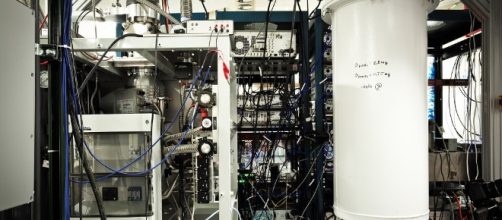Researchers at the University of Sussex have developed an innovative new approach to construct large scale Quantum computers (QC) utilizing present technology. The group of scientists demonstrated the success of their groundbreaking method with low error rate at their scientific facilities in Sussex. Q C makes use of quantum mechanic´s strange behavior at he microscopic scale to solve computational problems that classical computers are not able to solve.
Quantum computers
Computers with quantum capabilities offer more potential for solving the same computational problems that would take the fastest supercomputers of today more time to solve.
Q C can be built in principle; however, it would take technological and engineering challenges that in the present are considered to be hard to attain. One of the greatest challenges is avoiding quantum decoherence, which occurs when the system is not perfectly isolated from the outside environment.
Voltages directed onto a computer microchip
Q C on the micro scale is performed by utilizing captured ions (charged atoms) and aligning laser beams onto individual ions, each of those individual ions forming a quantum bit (qubit). When bringing the method to the large scale, a Q C would require billions of qubits, requiring similar quantities of aligned laser beams. To deal with this challenge, scientists have designed a simpler method that uses voltages applied to a Q C microchip, resulting in the a positive outcome.
Potential
Q C memory offers new potential in varied areas of informatics, including the ability to decipher many cryptographic systems, they would also allow to solve financial and scientific problems and permit the production of new materials and quantum technologies. They would permit the calculation of problems at a faster rate than typical binary computer systems presently do, helping advance the technology in the area of Q C.
In the present Q C development is still in an infancy state; however, research has been carried out on a small scale using only a small number of quantum bits. Large scale Q C would theoretically be capable of solving computational problems at a faster rate than classical computers. Scientists think that the development of Q C will impact society in the same way that classical computers did years ago.

